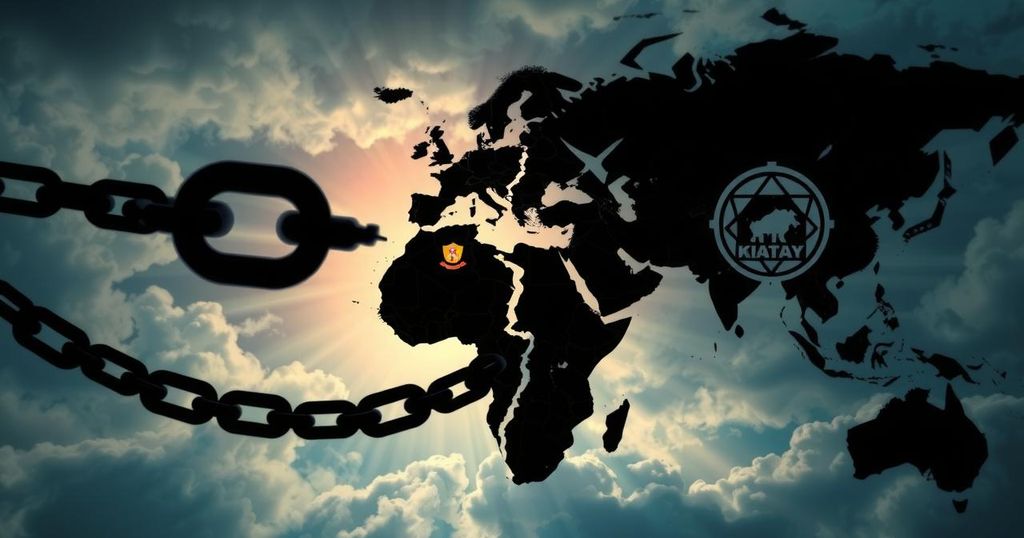DR Congo cut diplomatic ties with Rwanda as fighting intensified near Goma, with the M23 rebel group advancing and causing civilian displacements. Allegations of Rwandan support for M23 persist amidst a worsening humanitarian crisis, driving concerns over regional security. Amidst reports of casualties among peacekeepers, efforts to defend against M23 continue as the situation remains precarious.
The Democratic Republic of the Congo (DR Congo) severed diplomatic relations with Rwanda as the M23 rebel group, suspected of Rwandan support, advanced toward Goma. The fighting around this critical eastern city has resulted in the deaths of at least 13 peacekeepers and numerous foreign military personnel, resulting in a humanitarian crisis impacting thousands of civilians.
M23, predominantly composed of ethnic Tutsis who separated from the Congolese army over a decade ago, has gained substantial ground near Rwanda’s border. Accusations from DR Congo, the United States, and United Nations experts have implicated Rwanda in supporting M23, which is one of many armed groups contesting control in the mineral-wealthy eastern region.
While Rwanda’s government denies these allegations, it has admitted to deploying troops and missile systems within Congo to protect its national security, citing concerns over a buildup of Congolese military forces at the border. UN experts have estimated that approximately 4,000 Rwandan troops may currently be on Congolese territory.
Following the notice of severed relations, DR Congo’s Foreign Ministry instructed the immediate withdrawal of all diplomatic personnel from Rwanda. The Rwandan government has not yet provided any public comments regarding this decision. In response to the escalating violence, the United Nations Security Council advanced its emergency meeting to Sunday upon request from DR Congo.
Heavy gunfire was reported near Goma, prompting many displaced civilians to flee. Camps such as Kanyaruchinya saw an influx of families seeking safety, with residents expressing fears for their children’s welfare. Notably, multiple individuals cited bombings and shootings as reasons for their flight from the border areas toward Goma.
Displaced persons faced uncertainty regarding safety in Goma, with some residents expressing doubt about their security there as well. A local, Muahadi Amani, explained his motivations for crossing into Rwanda, stating that he sought refuge from the deteriorating safety situation. Earlier in the week, M23 had captured Sake, raising alarms that Goma could soon fall.
Congo’s military reported successfully defending against an M23 advance, aided by allied forces, including United Nations troops and the Southern African Development Community Mission (SAMIDRC). Tragically, several casualties have occurred among peacekeeping forces from South Africa and Malawi, indicative of the conflict’s toll on military personnel.
Since 2021, DR Congo and its allies, including U.N. forces and SAMIDRC, have worked to keep M23 at bay. MONUSCO, the United Nations peacekeeping force, has been present in Congo for over twenty years, operating with a force of around 14,000 personnel.
The conflict in eastern DR Congo stems from longstanding tensions involving a multitude of armed groups fighting for control of resources and territory. The M23 rebel group, formed over a decade ago, has frequently drawn allegations of external support, particularly from Rwanda. The region has witnessed significant military interventions and humanitarian crises, leading to international attention and concern.
The severance of diplomatic ties between DR Congo and Rwanda underscores the escalating conflict involving the M23 rebel group and the humanitarian crisis affecting civilians. With military engagements increasing and allegations of external support complicating the situation, calls for international intervention and resolution grow more pressing. The ongoing violence continues to displace thousands and heightens security concerns in the region.
Original Source: www.france24.com






